Unbox recently graduated from Spark to Unusual Collaboration. The Unbox team is developing a game-like tangible toolkit which allows inter- and transdisciplinary teams to ‘open’ the ‘black box’ of collaborative processes, through supporting participants in examining, discussing, and refining issues they encounter in the course of collaborations. In this blog post, the team reflects on their CUCo journey so far.
Written by Jonas Torrens and Jillian Student
The spark
Our journey in Unbox started with a Spark (training) three years ago, where three of us (Jonas Torrens, Jillian Student, and Federico Andreotti) met while training on interdisciplinary collaborations. The training was highly unusual (and on brand for the Centre for Unusual Collaborations) involving balancing poles, jazz metaphors, and alien encounters.
As the sessions progressed, a ‘spark’ emerged in a generative conversation about ‘opening up the black box of collaborations’. This spoke to how collaborations are usually treated as projects, with a taken-for-granted form of organizing, without discussing how processes should happen. The three of us noticed how many collaborations disappeared into the night without chances to get the team back on track.
The Spark training’s focus on process and its playfulness inspired us, sparking with other questions we were exploring in our work. The training brought forward an extra element: metaphors, and in particular, the metaphor cards designed by Dan Lockton and the Imaginaries Lab.
And the spark turns into a flame
The first conversations grew quickly into a heated exploration. Could we create an object/process/game that allowed teams to explore different forms of collaboration using physicalized metaphors? Could this object/process/game create possibilities for deepening inter- and transdisciplinary collaborations beyond the usual suspects and idealized models? Could this work as a companion to teams, helping them learn about collaborations as they progress?
With the shared language learned through the training, the initial team formed naturally, with a deep affinity to the topic, mutual curiosity, playfulness, and sufficient levels of overlap to create ease of communication. But we needed to expand our collaboration to move forward. Dan Lockton brought ample experience to the group working with (physicalized) metaphors and as a designer. Merijn Bruijnes, who joined the group later, was steeped in multiple transdisciplinary projects and knew how digital methods could be employed. Early in the process, CUCo provided a process facilitator from a visual design agency, Niva van de Geer, who was instrumental in helping us explore possibilities of using different sets of metaphors to afford other kinds of conversations.
And the flames start to grow
A small grant attached to the Spark training allowed us to explore these questions in a low-stakes, experimental way. Rather than adopting a prescriptive research design, we proceeded to familiarize ourselves with the space we were entering (metaphors, collaboration, workshop approaches). We settled for a research-by-design approach, recognizing that more than a model for collaboration, we needed to create the means for others to engage in facilitated conversations about collaborations. Designing the object would allow our team to formulate and test our assumptions and try out different versions and applications for Unbox.
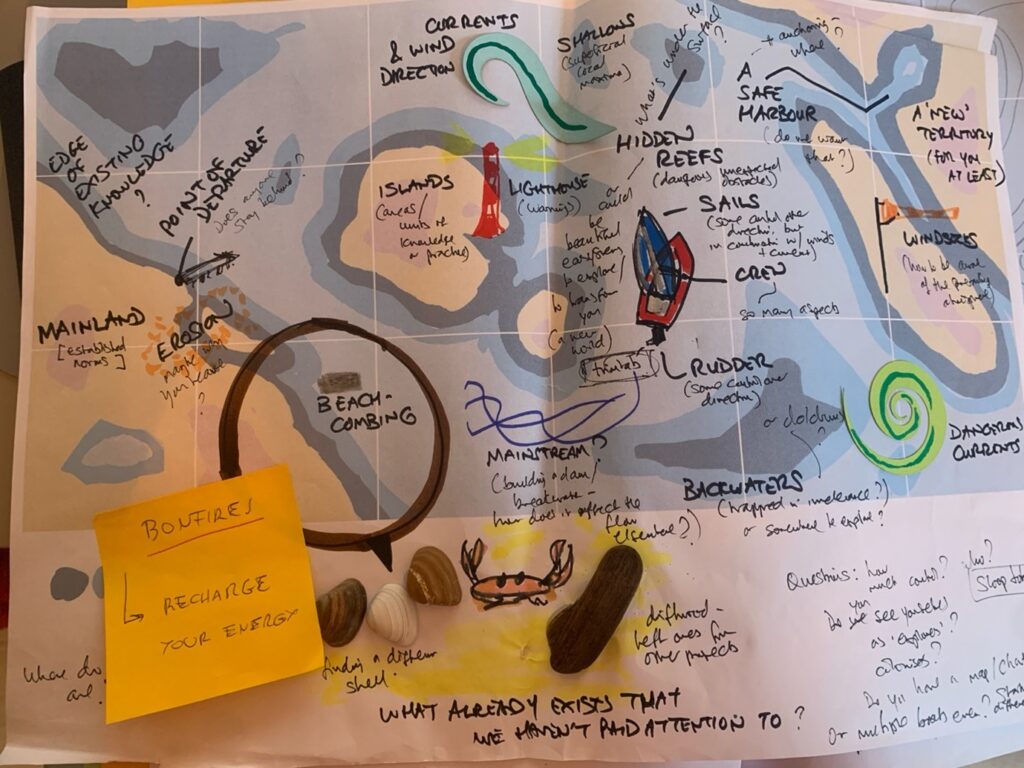
Early prototype, from our first retreat, featuring Dan Lockton.
We chose to work intensely, through retreats, to create space for genuine co-creation within the team. This space enabled our team to have a different kind of conversations with the material and with ourselves. In our first retreat, Dan brought two massive suitcases of materials and Merijn his 3D printer. Playing with the materials, we probed different collaboration challenges while trying to better understand our own. In less than three days, we had developed an initial version of Unbox.
Outside the retreats, we worked at a natural pace, following the ups and downs of our busy academic lives. The pleasure of working together, and the creativity of the group kept us coming back, despite the limited time we all had.
Fanning the flames
Although we had big ambitions for our second year, we had to switch gears when we did not receive the grant we had applied for. Over 2024, we could gradually materialize our approach through a handshake grant, with help from Kuangyi Xing, an up-and-coming designer who led the design of the specific objects. That greatly accelerated our process, with a more intentional and professional design process.
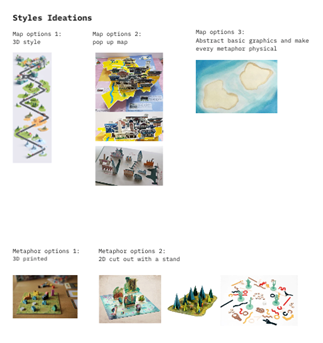
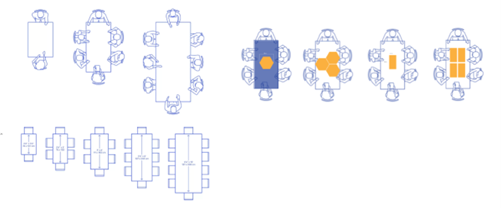
Glimpses of our style ideations, featuring Kuangyi Xing.
We settled on the following points:
- Folks starting to collaborate often bring implicit and misaligned assumptions about what’s at stake, appropriate forms of organizing;
- These assumptions tend to fall into routinized, projectified ways of thinking about research, but these are rarely homogeneous and consensual;
- Without appropriate facilitation, teams struggle to discuss foundational issues, and conversations tend to be limited by expedient project management concerns;
- Disagreements about the parameters of collaboration dominate discussions, sidelining conversations about the foundational assumptions (e.g. when is the deadline, instead of what kind of temporal arrangement we need);
- Metaphors are ubiquitous in conversations about collaboration (e.g. how can we navigate these issues? Are we all on the same boat?), but their specific meanings remain understated and often carry unhelpful connotations. The word deadline, for instance, emerged in journalism but used to refer to a line used in US Civil War prisons that, if crossed, would lead to prisoners being shot by guards.
- Using specifically designed ‘metaphorical spaces’ (e.g. an illustrated board representing Outerspace) with physicalised metaphors (tokens evocative of metaphors) is an effective way of facilitating conversations with deep reflections on the foundational assumptions of collaborations;
- Different metaphorical spaces and metaphors prompt particular conversations, e.g. a nautic map invites conversations about distances (this objective is too far), logistics and sequencing (we need to do this before we can do that), environmental conditions (we would be sailing against the wind if we went there).
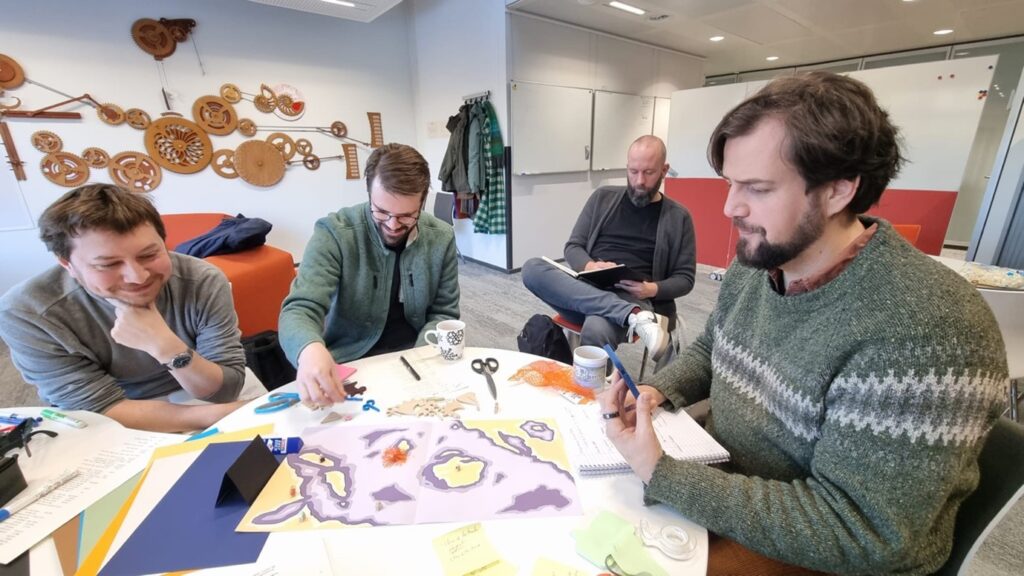
The Unbox team testing the first full prototype, at CUCo’s Nest. From left to right: Dan, Merijn, Niva and Jonas.
Later in 2024, we started to expand beyond our own collaboration and introducing Unbox to others. We used the game in workshops at one of the CUCo community days, the conference of the Systemic Design Association (RSD24 in Oslo), the Inter- and Transdisciplinarity Conference (ITD In Utrecht), the Foundations of Inter and Transdisciplinary Research course (in Wageningen), and the PhD course on Transformative Research Practices (TPAR at Wageningen University).
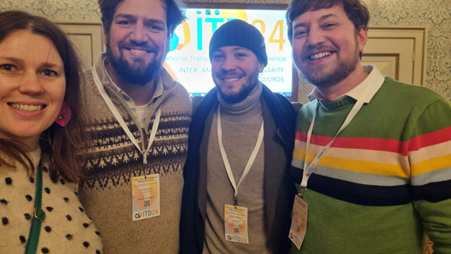
The Unbox team at the ITD24 conference. From left to right: Jillian, Jonas, Federico and Dan.
These events clarified that the premises outlined above hold but also gave us something to consider. First, we needed to consider how Unbox can exist in an unfacilitated setting: how much information people need, what kind of house rules need to be established, how to ease people into using metaphors. Second, we noticed that there were other opportunities for using Unbox (e.g. working with students) that have different set-up needs. Three, we needed to reconsider some of the metaphors we had developed and what affordances they created (i.e. finding the right words/metaphors to represent complex concepts).
Sharing the flame
In 2025, we continue our investigation/design by exploring other forms of application and distilling key learnings. Having had the time to try and test our assumptions and designs has been extremely fruitful. Nowadays, it is hard not to see how performative funding is. We are grateful to have had the chance to engage in this process, which leads to meaningful outcomes and provides new leads for our team as we develop as collaborative, transdisciplinary agents. While we did not prioritize publishing about the process in the first two years, as our ideas slowly coalesced, we now find a deeper drive from which to write for the scientific audience. Our design has matured, as have the questions that we are able to tackle. But the delight of the team has only increased.
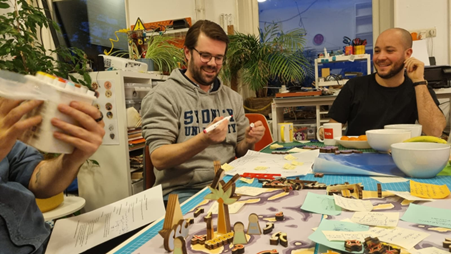
UCo launch at Dan Lockton’s studio. From left to right: Jonas, Merijn and Federico.
However, the learning we derive from Unbox goes deeper. Embodied experiences through metaphors generate conversation about hidden assumptions and give space for teams to gradually refine and co-create a shared story of their collaboration. Experiencing the playfulness of these conversations makes evident how sterile so many project management practices are, which stifle not only creativity but the vitality of teams.
What started as a straightforward way of addressing traditional project management’s shortcomings has revealed new possibilities as our journey continues to unfold. CUCo’s exploratory, playful, and spacious approach to funding has been fundamental. It gave us time and space to develop our ideas without the pressure of perfoming. In our current phase, we continue to playfully explore the collaborative process while we work to share the flame more concretely with others.